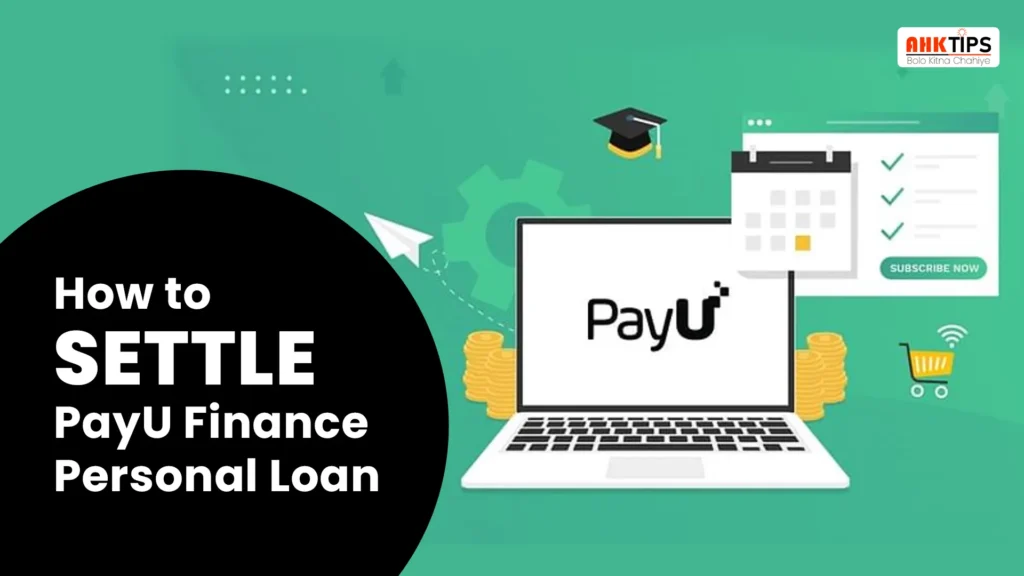Facing financial difficulties can sometimes make it challenging to keep up with personal loan payments. In such cases, settling the loan with the lender could be a viable solution. Settling a loan involves negotiating with the lender to repay a portion of the outstanding amount, after which the loan is marked as “settled” rather than “paid in full.” For PayU Finance Personal loan holders, the process of loan settlement involves understanding the steps involved, knowing how it impacts credit scores, and exploring possible alternatives.
This guide covers all aspects of settling a PayU personal loan, including eligibility, the step-by-step process, and the effects of settlement on credit.
What is Loan Settlement and Why Consider It?
Loan settlement is the process by which a borrower who is struggling to make regular payments negotiates with the lender to pay off a reduced amount in order to close the loan. Rather than marking the loan as “paid in full,” the lender marks it as “settled,” which signifies that the borrower could not pay the full amount but settled on a lesser payment to close the account. Settlement is typically considered as a last-resort option when no other solutions seem viable.
Why Consider Loan Settlement?
- Immediate Debt Relief: Settlement allows you to clear the debt at a lower cost than the original balance.
- Avoid Legal Proceedings: By settling, you can avoid having the debt sent to collections or the possibility of legal action.
- Manageable Solution for Financial Hardship: For those facing severe financial constraints, settlement can be a practical option to ease financial stress.
Impacts of Loan Settlement on Credit Scores
Choosing a loan settlement will affect your credit report and score. While it may provide short-term relief, it does not have the same positive effect as paying off the loan in full. A settled loan indicates to lenders that you were unable to meet the full payment terms, which can have lasting effects on your credit profile.
Credit Score Implications
- Negative Credit Score Impact: A “settled” status is recorded on your credit report, lowering your credit score.
- Future Lending Challenges: Lenders may view a settled loan as a risk, potentially leading to difficulties in securing future credit.
- Credit Repair After Settlement: Rebuilding credit after a settlement can take time, and future lenders may impose higher interest rates or stricter terms.
Eligibility for Settling a PayU Finance Personal loan
Eligibility for loan settlement typically depends on specific criteria set by PayU, including proof of financial hardship and a willingness to negotiate. Common eligibility factors include:
- Documented Financial Hardship: PayU may require proof that you’re facing genuine financial struggles.
- Delinquent Payments: A history of missed payments or partial payments can indicate that settlement may be the best option.
- Loan Tenure and Balance: The amount left unpaid and the time remaining on the loan may also affect eligibility.
Step-by-Step Guide to Settling a PayU Finance Personal loan
Successfully settling a loan involves a series of steps. Here’s a comprehensive process to help you through each stage:
Step 1: Assess Your Financial Situation
Before approaching PayU, determine the amount you can afford to pay. Calculate your monthly income, necessary expenses, and existing financial obligations. This amount should be realistic and a sum you can commit to paying in one transaction.
Step 2: Contact PayU Customer Service
The next step is to reach out to PayU’s customer service department. Explain your current financial hardship and discuss the possibility of settling the loan.
- Explain Your Situation: Be transparent about your financial difficulties.
- Request Settlement: Ask if they allow settlement for personal loans and inquire about the necessary documentation or criteria for settlement eligibility.
Step 3: Gather Necessary Documents
Documentation helps support your case, making it more likely that PayU will consider your settlement request. Commonly required documents may include:
- Bank Statements and Income Proof: These can demonstrate reduced income or financial strain.
- Expense Records: Showing your current expenses can add credibility to your hardship claim.
- Proof of Other Debts: If you’re managing multiple debts, documentation can help emphasise the difficulty in meeting PayU’s repayment terms.
Step 4: Negotiate the Settlement Amount
Once PayU agrees to consider settlement, begin the negotiation process:
- Start with a Low Offer: Propose a payment amount lower than what you’re ultimately willing to pay, providing room for negotiation.
- Request Fee Waivers: Request waivers for any late fees, penalties, or added interest.
- Agree on a Final Amount: Try to reach a settlement amount that satisfies both parties, which is usually 50-70% of the outstanding balance.
Step 5: Obtain a Written Agreement
Once you’ve agreed on a settlement figure, ensure you get all terms and conditions in writing. This agreement should outline the settlement amount, payment deadline, and the final status of your loan after payment.
- Read Carefully: Verify that the agreement specifies “settled” status and outlines any potential reporting to credit bureaus.
- Document Future Obligations: Ensure there’s no mention of further financial obligations after the settlement payment.
Step 6: Make the Settlement Payment
To finalise the settlement, make the payment within the agreed-upon time frame.
- On-Time Payment: Late payment could void the settlement, so prioritise this payment.
- Request a No-Dues Certificate: After completing payment, obtain a no-dues certificate, which confirms that no outstanding balance remains.
- Check Credit Report: After 30-45 days, check your credit report to verify that the loan is marked as “settled.”
Alternatives to Loan Settlement
If you’re unsure about settlement or want to avoid credit impact, there are alternatives:
Loan Restructuring
Loan restructuring involves modifying your loan terms, such as extending the repayment period, reducing monthly instalments, or lowering the interest rate.
Deferment or Payment Moratorium
Some lenders offer temporary payment deferments, giving borrowers time to regain financial stability without negatively impacting their credit.
Balance Transfer
If another lender offers lower interest rates, transferring your balance could help reduce monthly payments and ease financial strain.
Important Points to Consider
- Credit Impact: Remember that settlement will affect your credit report and future borrowing options.
- Negotiate Wisely: Start negotiations with a low offer and make sure all terms are documented.
- Timely Payment: Completing the settlement payment on time is essential to avoid renegotiation or voiding the agreement.
Conclusion
Settling a PayU Finance Personal loan can offer financial relief to those struggling with payments, although it’s important to understand the potential effects on credit scores and future borrowing opportunities. If settlement seems like the only option, approach the process carefully: assess your financial situation, negotiate strategically, and ensure all terms are documented in a written agreement. For those open to other solutions, loan restructuring, deferments, and balance transfers may provide alternative relief without impacting credit scores as significantly.
By following these steps and carefully evaluating your options, you can make an informed decision about settling your PayU personal loan in a way that meets both your immediate needs and long-term financial goals.
Frequently Asked Questions (FAQ’s)
Ans: Most lenders agree to settle at around 50-70% of the outstanding balance, depending on the borrower’s financial situation.
Ans: Settlement is generally done in a single payment. Discuss options with PayU if necessary, though they may prefer a lump-sum amount.
Ans: Settling a loan can negatively impact your credit score, as the loan will be marked as “settled” rather than “paid in full.”
Ans: Yes, but the “settled” status on your credit report may lead to stricter terms or higher interest rates on future loans.
Ans: A no-dues certificate is proof from the lender that you have cleared the settled amount and have no outstanding balance on the loan.













